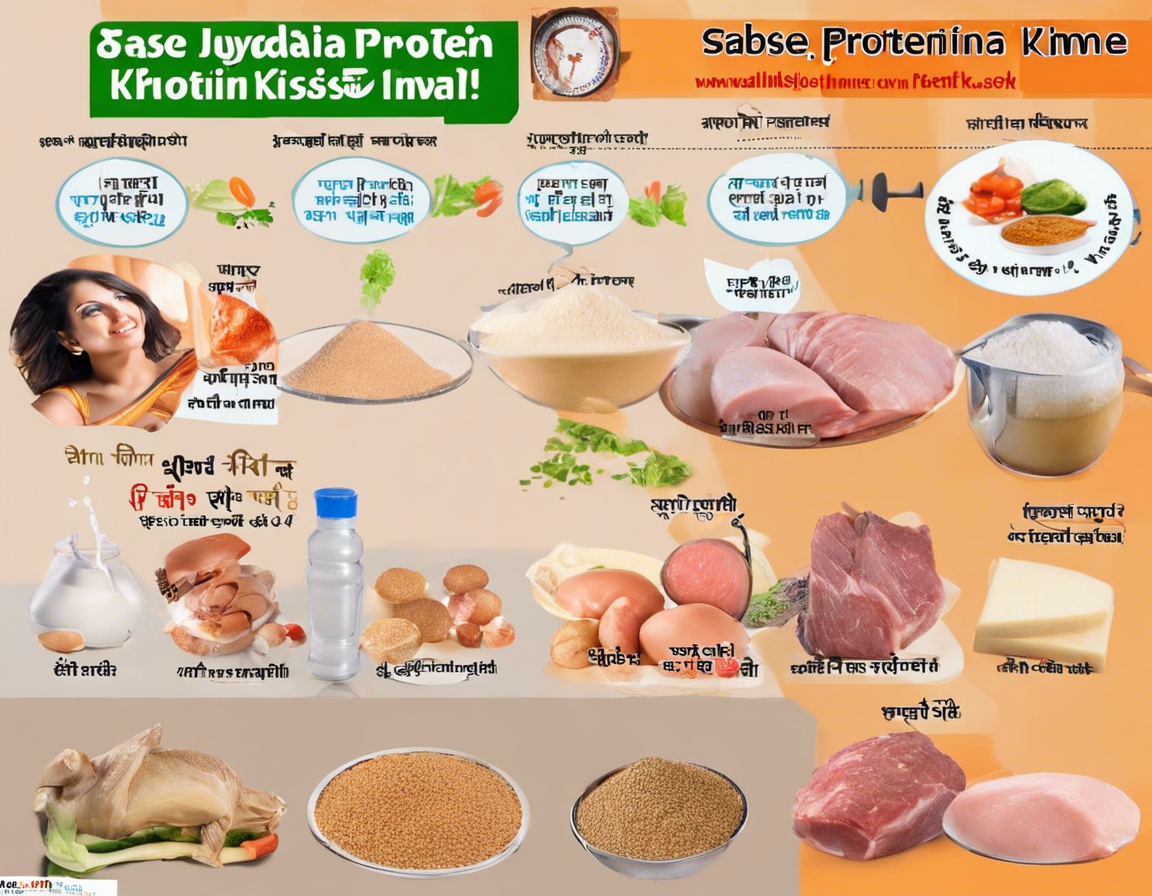Top 10 High Protein Foods: List of Foods with the Most Protein
Uncategorized May 20, 2024

Proteins are essential nutrients that play a pivotal role in maintaining the overall health and functionality of the human body. They are the building blocks of tissues, muscles, enzymes, and hormones, and are crucial for proper growth and development. Including high-protein foods in your diet is important to ensure that you are meeting your nutritional needs and supporting your body’s various functions. In this article, we will explore the top 10 high-protein foods that you can incorporate into your diet.
Benefits of High-Protein Foods
Before we dive into the list of high-protein foods, let’s discuss some of the key benefits of including them in your diet:
1. Muscle Growth and Repair
Proteins are crucial for building and repairing muscle tissues, making them essential for individuals looking to increase muscle mass or recover from intense workouts.
2. Weight Management
Protein-rich foods can help you feel fuller for longer periods, reducing overall calorie intake and supporting weight loss and weight management efforts.
3. Metabolism Boost
Proteins have a higher thermic effect compared to fats and carbohydrates, which means that the body burns more calories to digest and metabolize protein, potentially aiding in weight loss.
4. Immune Function
Proteins play a vital role in the proper functioning of the immune system, helping the body defend against infections and illnesses.
Now, let’s explore the top 10 high-protein foods that you can include in your diet to reap these benefits:
1. Chicken Breast
Chicken breast is a popular and versatile protein source that is low in fat and high in protein. It is easy to cook and can be included in a variety of dishes, making it a staple in many diets focused on muscle building or weight loss.
2. Eggs
Eggs are a complete protein source, meaning they contain all the essential amino acids that the body needs. They are also rich in nutrients like choline and antioxidants, making them a nutritious addition to your diet.
3. Greek Yogurt
Greek yogurt is a creamy and protein-packed dairy product that can be enjoyed on its own, mixed with fruits, or used as a base for smoothies and dips. It is high in calcium, probiotics, and, of course, protein.
4. Salmon
Salmon is not only a great source of protein but also rich in heart-healthy omega-3 fatty acids. Including salmon in your diet can support muscle growth, brain function, and overall health.
5. Lentils
Lentils are a plant-based protein source that is also high in fiber, making them a great option for vegetarians and vegans. They are versatile and can be used in soups, stews, salads, and more.
6. Cottage Cheese
Cottage cheese is a type of cheese that is low in fat and high in protein. It can be enjoyed on its own, mixed with fruits or nuts, or used as a substitute for higher-fat cheeses in recipes.
7. Quinoa
Quinoa is a gluten-free whole grain that is also a complete protein source. It is packed with nutrients like fiber, iron, magnesium, and antioxidants, making it a nutritious addition to any diet.
8. Turkey Breast
Turkey breast is a lean protein source that is low in fat and calories. It can be roasted, grilled, or added to sandwiches and salads for a healthy and delicious meal option.
9. Tofu
Tofu is a soy-based protein source that is popular in vegetarian and vegan diets. It is versatile and can be used in stir-fries, soups, salads, and more, providing a good amount of protein per serving.
10. Almonds
Almonds are a protein-rich nut that is also high in healthy fats, fiber, vitamins, and minerals. They make for a convenient and nutritious snack that can help curb hunger and boost energy levels.
Including a variety of these high-protein foods in your diet can help you meet your daily protein needs and support your overall health and wellness goals. Remember to balance your protein intake with carbohydrates, fats, vitamins, and minerals for a well-rounded and nutritious diet.
Frequently Asked Questions (FAQs):
1. How much protein do I need per day?
The recommended dietary allowance (RDA) for protein is 0.8 grams per kilogram of body weight, but individual protein needs may vary based on factors like activity level, age, and muscle mass.
2. Can I get enough protein from plant-based sources?
Yes, you can get enough protein from plant-based sources like beans, legumes, nuts, seeds, tofu, tempeh, and whole grains. Combining different plant-based protein sources can help you create complete protein meals.
3. Are protein supplements necessary for muscle building?
Protein supplements can be convenient for individuals who struggle to meet their protein needs through whole foods alone, but they are not necessary for most people. Whole foods should always be the primary source of nutrients in your diet.
4. Is it possible to consume too much protein?
While high-protein diets are generally safe for healthy individuals, consuming excessive amounts of protein over a long period may put strain on the kidneys and liver. It is essential to stay within recommended daily protein intake levels.
5. Can athletes benefit from higher protein intake?
Athletes and individuals engaged in intense physical activity may have higher protein requirements to support muscle repair, recovery, and performance. Consulting with a sports nutritionist can help determine the ideal protein intake for athletic goals.
In conclusion, prioritizing high-protein foods in your diet can have numerous health benefits, from supporting muscle growth and weight management to boosting metabolism and immune function. By incorporating a variety of protein sources into your meals and snacks, you can meet your daily protein needs while enjoying a diverse and nutritious diet.